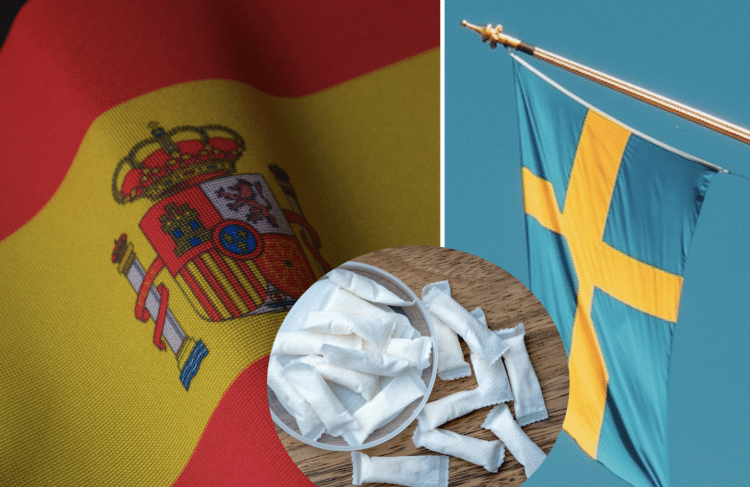
Spain resorts to ‘ideological’ defence of pouch ban proposal
Spain has responded to Sweden’s detailed opinion opposing proposed restrictions on nicotine pouches in a reply marked by exaggerated claims and devoid of scientific rigour.
“This is ideological posturing, not serious public health policy,” says Patrik Strömer, Secretary General of the Association of Swedish Snus Manufacturers.
In a lengthy 11-page reply sent to the European Commission, Spain defends a proposed ban on flavoured nicotine pouches and a maximum nicotine limit of 0.99 milligrams per pouch — a limit that would effectively remove nearly all products currently on the market.
The Spanish government argues the measures are needed to protect public health, especially among youth, citing a rise in vaping and early tobacco use, and that Article 36 of the EU Treaty allows for introducing proportionate and justified measures to protect public health.
The letter frames the proposed restrictions as part of a broader tobacco control overhaul, pointing out that Spain’s national legislation hasn’t been comprehensively updated in over 15 years.
“After more than a decade without revising the regulations, together with the circumstance of the current enormous dynamism of the market for tobacco and related products, the national regulations are now greatly outdated and urgently need to be updated due to their failure to adapt to the current situation of the tobacco and related products market in Spain,” the letter states.
Spain also cites other EU member states that have taken restrictive stances on nicotine pouches – including France, Belgium, and the Netherlands – and points to recommendations from the WHO Framework Convention on Tobacco Control (FCTC), which encourage stronger regulation of novel nicotine products.
Alarmism over analysis
However, Strömer argues that Spain’s justification lacks scientific rigour and fails to meet the EU’s requirement for proportionality. Instead of grounding its argument in updated risk assessments, Spain leans heavily on alarmist language and cherry-picked references.
“They call tobacco an ‘epidemic’, which is a false analogy,” Strömer tells Snusforumet.
“Tobacco use is not an infectious disease. And across the OECD, nicotine consumption is falling – not rising.”
Spain’s response suggests, for example, there are links between nicotine and cancer even though the International Agency for Research on Cancer (IARC) does not classify nicotine as a carcinogen.
Spain even goes so far as to justify its 0.99 mg limit by twisting conclusions from a 2022 risk evaluation by Germany’s Federal Institute for Risk Assessment (BfR) that concludes nicotine pouches have a lower risk profile than other consumer nicotine products.
“The real issue here is a kind of nicotine panic, not science,” says Strömer.
“If Spain truly wanted to protect its citizens, it would copy Sweden’s evidence-based regulation — not ban the very products helping people quit smoking.”
Harm reduction or ideological posturing?
The Spanish proposal is part of a broader crackdown across the EU, where multiple member states — including France, Belgium, and the Netherlands — have enacted bans or severe restrictions on nicotine pouches.
But Sweden’s smoking rate is the lowest in Europe, with daily use at just over 5 percent. Public health experts attribute this largely to the availability of lower-risk products like snus and pouches — products now under threat across much of the continent.
“Spain is using outdated arguments and bypassing proportionality,” Strömer says.
“This is not about protecting children — it’s about pushing an ideological agenda. Flavour bans without scientific backing are arbitrary. Sweden, by contrast, bases its regulations on EFSA’s risk assessments. That’s the path other countries should follow.”
What’s next?
The dispute between Spain and Sweden is being closely watched as the EU reviews its Tobacco Products Directive (TPD). Nicotine pouches currently fall into a regulatory grey zone not explicitly covered by the TPD, giving member states significant leeway – but also creating tensions over internal market rules.
For Sweden, nicotine pouches are viewed not as a threat, but as a public health asset.
“We’ve shown that harm reduction works,” says Strömer.
“Instead of banning safer alternatives, Europe should be learning from Sweden. Protecting consumer choice is not just about trade – it’s about saving lives.”
Under the EU’s internal market rules, Spain must now consider Sweden’s formal objections before proceeding.
If Madrid ignores the warnings, the case could escalate to the European Commission — or even to the European Court of Justice.
“This is a fight about more than just snus,” Strömer concludes.
“It’s about whether Europe wants to reduce smoking — or just sound like it does.”




